Publications
This page collects together publications on issues related to women in politics from both the Pacific and the world. It collects together research documents, campaigning resources and key papers. If you have a publication we have missed, please send it to the PacWIP team at pacwip@gmail.com.
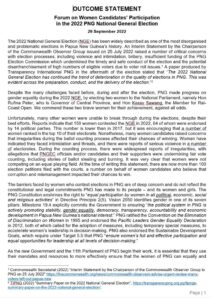
Outcomes Statement: Forum on Women Candidates’ Participation in the 2022 PNG National General Election
To assist the Government and other stakeholders to address the many challenges evidenced during the 2022 NGE, this Forum brought together women candidates from across the country to reflect on their experiences and offer recommendations to PNG’s leaders and partners for urgent action. Thirty-one women candidates were convened by the IPPCC and UNDP from all four of PNG’s regions.
Author: N/A
Institution: UNDP & IPPCC
Date: September 29, 2022
File size and type: 211.45 KB
Download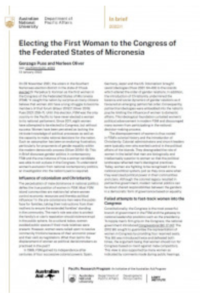
Electing the First Woman to the Congress of the Federated States of Micronesia
On 29 November 2021, the voters in the Southern Namoneas election district in the state of Chuuk elected Dr Perpetua S. Konman as the first woman in the Congress of the Federated States of Micronesia (FSM). It caught the nation by surprise as many citizens believe that women still have a long struggle to become members of that forum. Until this election, FSM was the only country in the Pacific to have never elected a woman to its national parliament. Since 2011, eight women have attempted to be elected to Congress, but without success. Women have been perceived as lacking the intricate knowledge of political processes as well as the capacity to make rational decisions for the nation. Such an assumption has been an enduring frustration, particularly for proponents of gender equality within the modern democratic process. This In Brief discusses gender politics in contemporary FSM and the one instance of how a woman candidate was able to win a place in the Congress. To understand women’s exclusion from national contemporary politics, an investigation into the nation’s past is required.
Author: Gonzaga Puas & Norleen Oliver
Institution: Department of Political Affairs, ANU
Date: January 31, 2022
File size and type: 133.03 KB
Download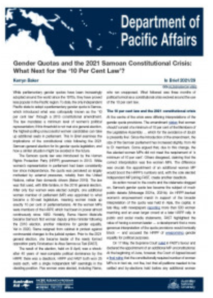
Gender Quotas and the 2021 Samoan Constitutional Crisis: What Next for the ‘10 Per Cent Law’?
While parliamentary gender quotas have been increasingly adopted around the world since the 1970s, they have proved less popular in the Pacific region. To date, the only independent Pacific state to adopt a parliamentary gender quota is Samoa, which introduced what was colloquially known as the ‘10 per cent law’ through a 2013 constitutional amendment. The law mandates a minimum level of women’s political representation; if this threshold is not met at a general election, the highest-polling unsuccessful women candidates can take up additional seats in parliament. This In Brief examines the implications of the constitutional crisis following the 2021 Samoan general election for its gender quota legislation, and how a similar situation might be avoided in the future.
Author: Dr Kerryn Baker
Institution: Department of Political Affairs, ANU
Date: October 31, 2021
File size and type: 1.20 MB
Download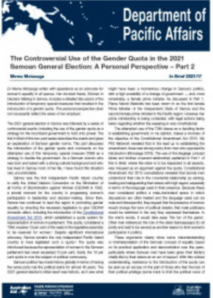
The Controversial Use of the Gender Quota in the 2021 Samoan General Election: A Personal Perspective – Part 2
The 2021 general election in Samoa was followed by a series of controversial events, including the use of the gender quota as a strategy for the incumbent government to hold onto power. The first In Brief of this two-part series describes the events and gives an explanation of Samoan gender norms. This part discusses the introduction of the gender quota and comments on the attempted use of this temporary special measure (TSM) as a strategy to decide the government.
Author: Dr Mema Motusaga
Institution: Department of Political Affairs, ANU
Date: June 1, 2021
File size and type: 1.21 MB
Download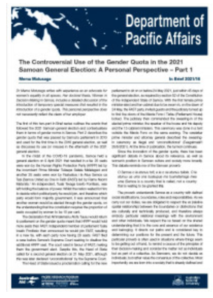
The Controversial Use of the Gender Quota in the 2021 Samoan General Election: A Personal Perspective – Part 1
The first of this two-part In Brief series outlines the events that followed the 2021 Samoan general election and contextualises them in terms of gender norms in Samoa. Part 2 describes the gender quota that was passed by Samoa’s parliament in 2013 and used for the first time in the 2016 general election, as well as discusses its use (or misuse) in the aftermath of the 2021 general election.
Author: Dr Mema Motusaga
Institution: Department of Political Affairs, ANU
Date: May 31, 2021
File size and type: 1.23 MB
Download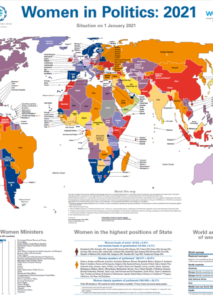
IPU/UN Women “Women in politics: 2021” map
The “Women in politics: 2021” map, created by the Inter-Parliamentary Union (IPU) and UN Women, presents global rankings for women in executive, government, and parliamentary positions as of 1 January 2021. It shows all-time highs for the number of countries with women Heads of State and/or Heads of Government, and for the global share of women ministers, parliamentary speakers, and parliamentarians.
Author: N/A
Institution: Inter-Parliamentary Union & UN Women
Date: March 10, 2021
File size and type: 397.15 KB
Download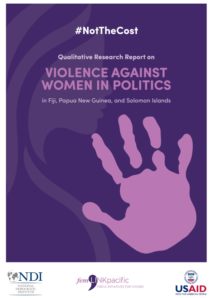
#NotTheCost: Qualitative Research Report on Violence Against Women in Politics in Fiji, Papua New Guinea, and Solomon Islands
Women are historically underrepresented in politics in the Pacific Islands; Fiji, Papua New Guinea, and Solomon Islands are no exception. At the same time, women in all three countries experience shocking levels of violence, in the home and in public. The convergence of traditional patriarchal gender stereotypes and societies accustomed to gender-based violence prevents women from claiming their political rights in democratic processes. This assessment builds on and contributes to research and action by the National Democratic Institute to eliminate violence against women in politics (VAW-P).
Author: N/A
Institution: National Democratic Institute & FemLink Pacific
Date: January 19, 2021
File size and type: 905.03 KB
Download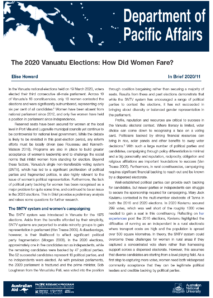
The 2020 Vanuatu Elections: How Did Women Fare?
In the Vanuatu national elections held on 19 March 2020, voters elected their third consecutive all-male parliament. Across 10 of Vanuatu’s 18 constituencies, only 18 women contested the elections and were significantly outnumbered, representing only six per cent of all candidates. Women have been absent from national parliament since 2012, and only five women have held a position in parliament since independence. This "In Brief" provides a preliminary analysis on women’s representation in Vanuatu politics and raises some questions for further research.
Author: Elise Howard
Institution: ANU Department of Political Affairs
Date: August 21, 2020
File size and type: 1.17 MB
Download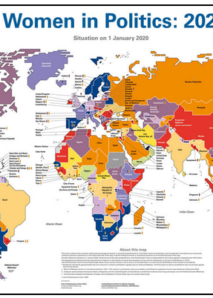
IPU/UN Women “Women in politics: 2020” map
The “Women in politics: 2020” map, created by the Inter-Parliamentary Union (IPU) and UN Women, presents global rankings for women in executive, government, and parliamentary positions as of 1 January 2020. It shows all-time highs for the number of countries with women Heads of State and/or Heads of Government, and for the global share of women ministers, parliamentary speakers, and parliamentarians. Still, 25 years after the Beijing Declaration and Platform for Action, which set the international target for reaching gender balance in political decision-making, women are underrepresented across all levels of power.
Author: N/A
Institution: Inter-Parliamentary Union & UN Women
Date: March 9, 2020
File size and type: 455.25 KB
Download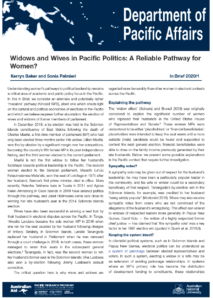
Widows and Wives in Pacific Politics: A Reliable Pathway for Women?
Understanding women’s pathways to political leadership remains a critical area of academic and public policy focus in the Pacific. In this In Brief, Baker and Palmieri consider an alternate and potentially rather ‘macabre’ pathway (Kincaid 1978), albeit one which sheds light on the cultural and political economies of elections in the Pacific and which they believe requires further elucidation: the election of wives and widows of former members of parliament.
Author: Kerryn Baker, Sonia Palmieri
Institution: ANU Department of Political Affairs
Date: July 10, 2020
File size and type: 1.18 MB
Download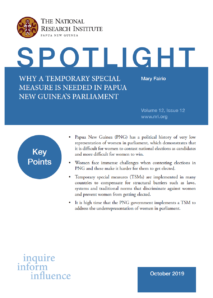
Why A Temporary Special Measure Is Needed In Papua New Guinea’s Parliament
This paper is based on a desktop review and findings from a study carried out by Fairio and others on women in the 2017 national elections and women in the local-level government elections.
The study finds that women face immense challenges when contesting elections. The continuous trend of underrepresentation of women in parliament is a major concern for PNG as a democratic nation. Without any interventions to address the gender gap in parliament, this trend is likely to continue for the next 40 years too. A holistic approach, especially political will and support, is needed to improve the under-representation of women in parliament. This paper emphasises the need to implement a TSM to address the long-standing under-representation of women in the PNG parliament.
Author: Mary Fairio
Institution: PNG National Research Institute
Date: July 31, 2020
File size and type: 217.21 KB
Download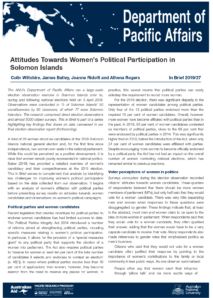
Attitudes Towards Women’s Political Participation in Solomon Islands
The ANU’s Department of Pacific Affairs ran a large-scale election observation exercise in Solomon Islands prior to, during and following national elections held on 3 April 2019. Observations were conducted in 15 of Solomon Islands’ 50 constituencies by 90 observers, of which 77 were Solomon Islanders. The research comprised direct election observations and almost 5000 citizen surveys. This In Brief is part of a series highlighting key findings that draws on data canvassed in their final election observation report.
Author: Colin Wiltshire, James Batley, Joanne Ridolfi, Athena Rogers
Institution: ANU Department of Political Affairs
Date: September 21, 2020
File size and type: 1.18 MB
Download
